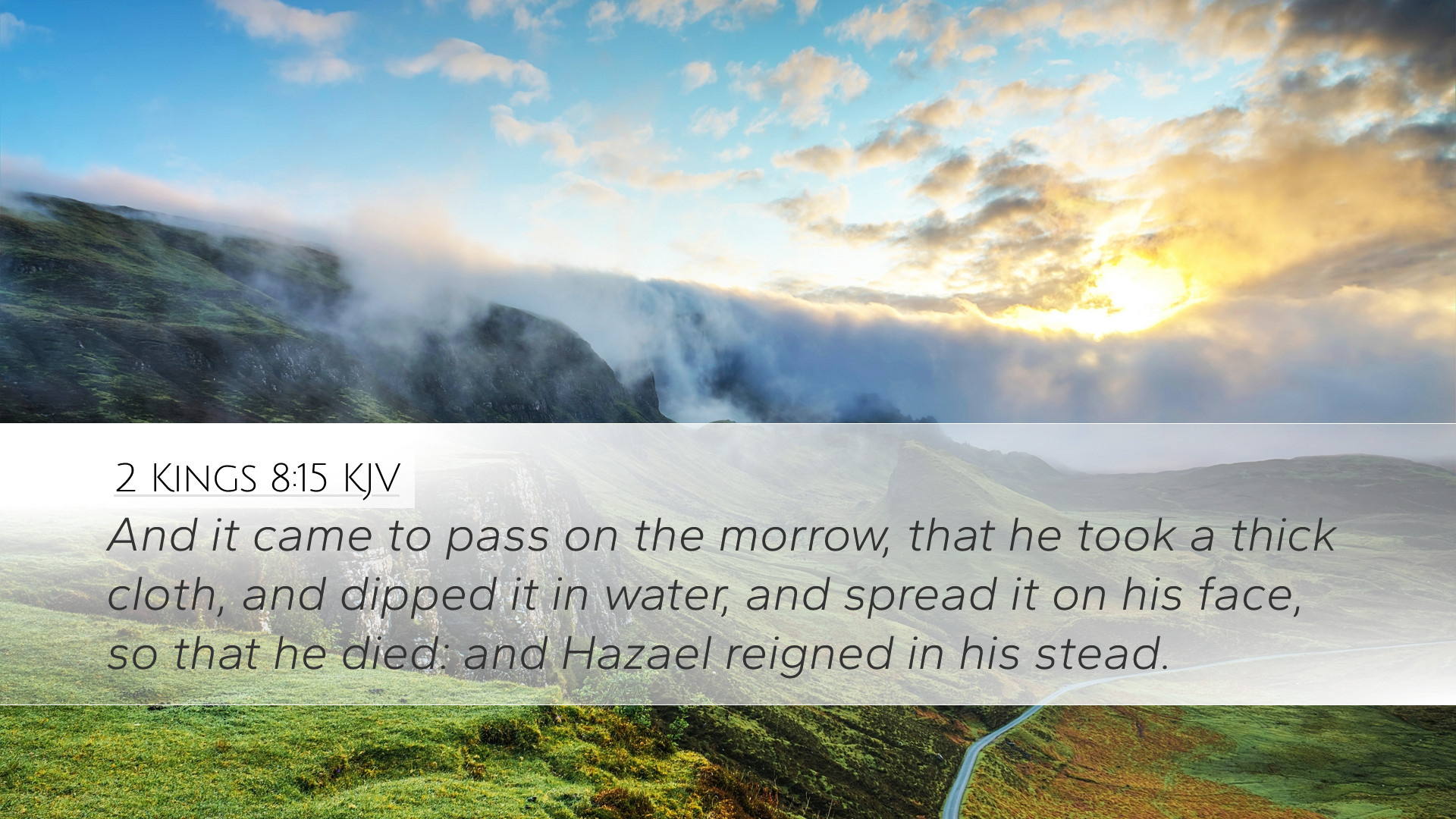Commentary on 2 Kings 8:15
Bible Verse: 2 Kings 8:15 - "But Elisha the prophet had foresight of it; and he went on to tell Hazael, ‘The LORD has shown me that you are to be king over Syria.’"
Introduction
This verse encapsulates a significant moment in the narrative of 2 Kings, highlighting the prophetic role of Elisha, the transition of power in Syria, and the interplay of divine sovereignty and human agency. In this commentary, insights from Matthew Henry, Albert Barnes, and Adam Clarke are synthesized to provide a richer understanding of this text.
Contextual Background
The context of 2 Kings 8 details a period of turmoil and change in both Israel and the surrounding nations. Elisha emerges as a pivotal figure whose prophetic leadership shapes the fate of kingdoms. Throughout this chapter, we witness God's dealings with His people through His messenger, Elisha, at a time when political stability was tenuous.
Political Intrigue and Divine Revelation
Hazael, the servant of Benhadad king of Syria, is introduced in the narrative as a significant character. The health crisis affecting Benhadad opens the door for Elisha's prophetic insight. This moment illustrates how God uses situations that seem ordinary to convey profound truths and future realities.
The Role of Elisha as a Prophet
Elisha’s prophetic gifts are underscored in this passage, marking him as a man who communicates God’s will with clarity. According to Matthew Henry, Elisha acts with a sense of urgency and purpose, demonstrating that he is a vessel of God’s truth.
- Divine Foresight: Elisha's ability to foresee Hazael's future kingship signifies God's omniscience. Elisha does not simply predict; he affirms God's plans for Syria’s governance.
- Prophetic Authority: The passage emphasizes the weight of prophetic words. Elisha’s pronouncement carries consequences that extend beyond individuals to nations.
Analysis of Hazael
Hazael received insight into his destiny, a profound yet sobering moment as he is directed toward a future marked by violence and conflict. Albert Barnes points out that while God's intentions are clear, Hazael's response to this foresight will shape his character and actions.
- Path to Leadership: Hazael's rise to power entails moral and ethical implications, as he was prophesied to be a cause of suffering for Israel.
- Human Agency vs. Divine Sovereignty: While the prophecy indicates a predetermined outcome, Hazael’s choices underscore the complex dynamics between divine foreknowledge and human decision-making.
Implications for Theological Reflection
This verse raises crucial theological questions regarding prophecy, free will, and God's control over history.
- The Nature of Prophecy: Prophecy in this context serves as both warning and declaration, inviting reflection on how God communicates with humanity across time.
- God's Sovereignty: Elisha’s prophecy illustrates God's authority over national affairs, reminding believers of His ultimate control over human history.
Conclusion
In summary, 2 Kings 8:15 presents a critical juncture in the biblical narrative where God’s sovereignty and human response converge. Through the insights of Matthew Henry, Albert Barnes, and Adam Clarke, we glean a deeper understanding of the prophetic ministry of Elisha and the weight of his declarations. The passage encourages pastors, students, theologians, and scholars to consider the implications of divine revelation for both personal faith and broader ecclesiastical contexts.


